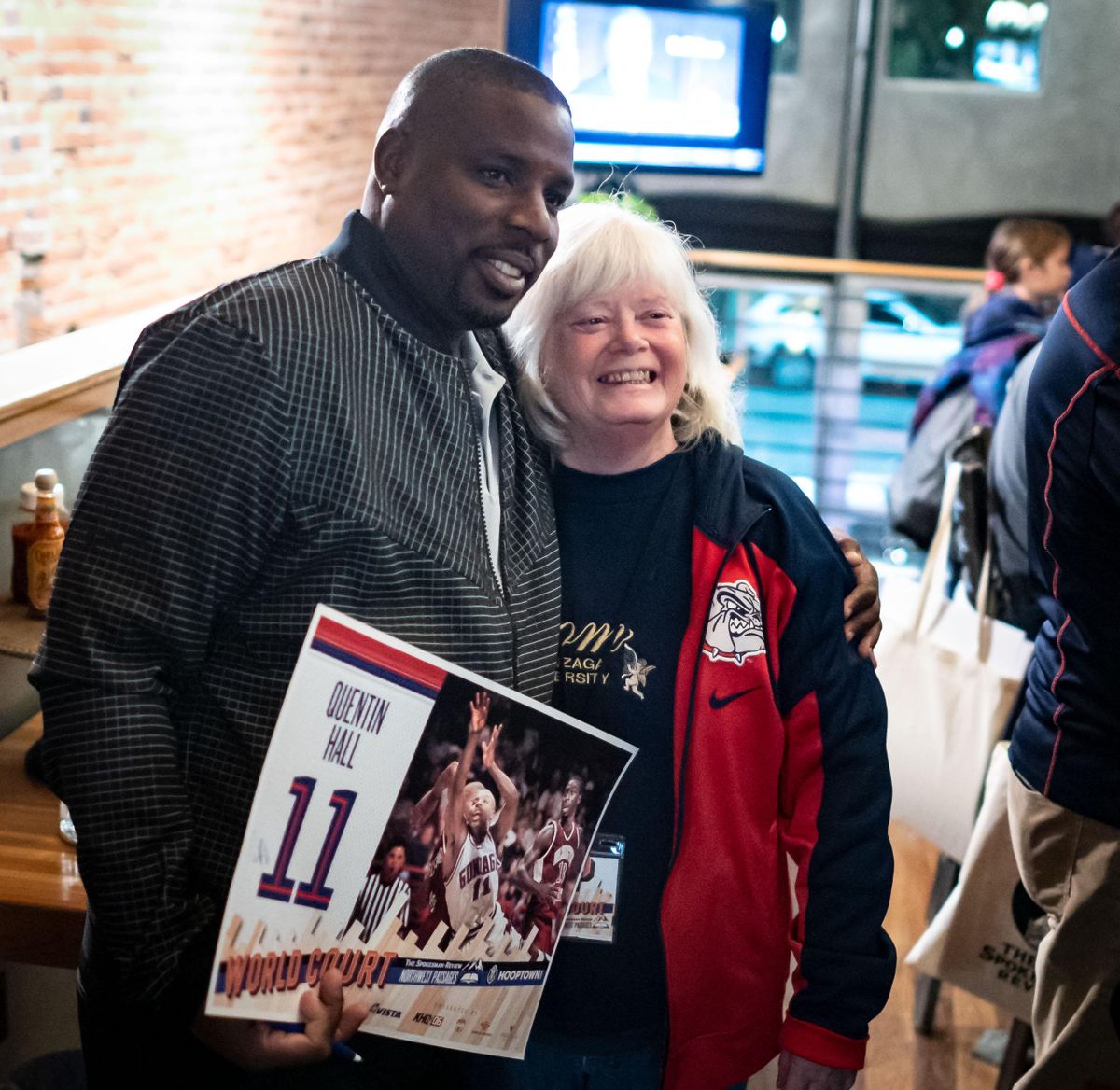World Court: Gonzaga international recruiting discussion doubles as fundraiser for former Zag Quentin Hall’s hurricane relief

The genesis of Gonzaga’s international recruiting push started with an exchange student, when Tommy Lloyd was growing up in Kelso, Washington.
Lloyd, now an assistant coach for the men’s basketball team, was a teenager when his parents agreed to host an exchange student while Lloyd’s older brother was studying abroad.
“The next thing I know, we’ve got a Japanese dude living with us,” Lloyd said. “We had exchange students every year after that.”
Now, the Gonzaga men’s basketball roster has as many international players as it has ones born in the United States, a trend Lloyd and women’s basketball coach Lisa Fortier discussed Monday night at The Bing in “World Court,” part of The Spokesman-Review’s Northwest Passages series.

The event also doubled as a fundraiser for Quentin Hall, one of the men’s program’s first international recruits whose house in the Bahamas was heavily damaged by Hurricane Dorian in early September.
Jesse Tinsley
- The Spokesman-Review
The second half of Lloyd’s recruiting genesis story came years later when coach Mark Few stopped by his graduate assistant’s office.
“This one day he flipped a German U-18 roster on my desk,” Lloyd said of Few, “and he said, ‘Hey, you’re doing a great job with the guys, but if you wanna make it in this business you gotta create a niche. So, why don’t you start checking on these guys?’ And that’s how it started.”
Currently the men’s team has players from five foreign countries: Serbia, Lithuania, Russia, France, and Mali. The trend goes back to the days of Hall, a hero of the 1999 Elite 8 team and a native of the Bahamas.
In between, Gonzaga’s list of international players includes Rui Hachimura (Japan), Przemek Karnowski (Poland), Domantas Sabonis (Lithuania), Kelly Olynyk (Canada), JP Baptista (Brazil), and many others.
But the women’s team also has acquired an international flair at Gonzaga, with players from Lithuania, Canada and Australia on its current roster.
For American players, going to a program in a major conference is often very important, Fortier said. But players from outside the United States don’t care as much, she said.
“Gonzaga on the women’s side, we’re not necessarily a T-shirt team,” Fortier said. “The great thing about international players is they don’t know the difference between Gonzaga, Stanford, Northwestern, Minnesota. … We’ve had great success with recruiting international players in that regard.”
There are logistical challenges – and costs – to recruiting internationally. Lloyd told the story of how when he first took Few up on his suggestion, in one month he ran up a $1,200 phone bill. Lloyd also spends a lot of time on the phone between 11 p.m. and 2 a.m., compensating for the 9-hour time difference between Spokane and much of Europe.
But the effort has paid dividends for the program, which Lloyd said had to overcome its smaller home market but has now grown to be a perennial power.
“I love what it adds to the locker room. Usually about half our team’s international,” Lloyd said. “And, to be honest with you, it was born out of necessity a little bit. … It was one thing that built a little momentum, and then we parlayed it a little bit.
“Now we’re pretty comfortable with almost any team. We can recruit with them on the international market.”
The rest of the night belonged to Hall. His wife and three sons accompanied him on the visit to Spokane.
Hall was introduced by Eric Edelstein, a Gonzaga graduate and actor who noted his characters’ propensity to die in films.
“This body and this face is meant to die in horror movies,” Edelstein told the crowd.
Teammates told stories of Hall, whose trash talking and ribbing of opponents reached an apex when the point guard entered the pregame huddle of Gonzaga’s Elite 8 opponent, UConn, in 1999.
“And then, (UConn player) Richard Hamilton puts his hand out to shake, and (Hall) just hits it as hard as he could,” Casey Calvary said of his teammate. “Q(uentin) was not intimidated.”
More than 20 Gonzaga women’s and men’s players and coaches stuck around to sign posters afterward. Donations from the event went to the Hall family to help rebuild their home. Including an initial $10,000 through a GoFundMe page, donations for the Hall family had nearly reached $50,000 before Monday’s event.
“I’ve lost everything, but I’ve got everything,” Hall said of his friends and teammates on stage. “I got you guys.”